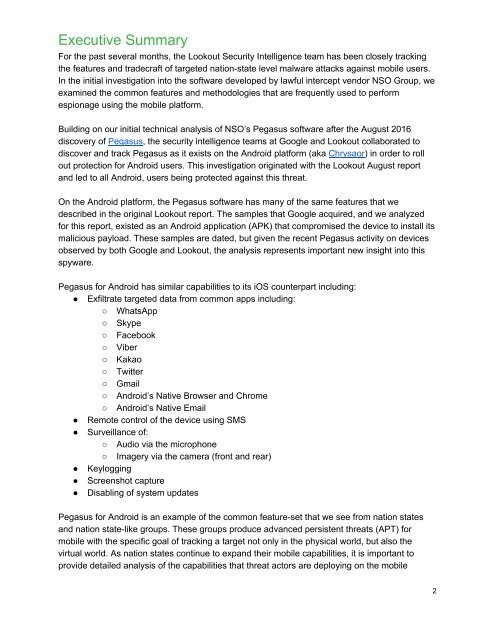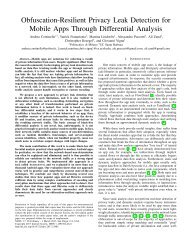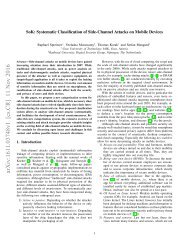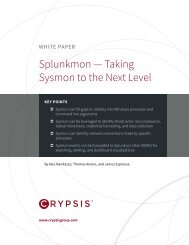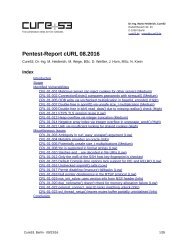Pegasus for Android
eatsvTG
eatsvTG
Create successful ePaper yourself
Turn your PDF publications into a flip-book with our unique Google optimized e-Paper software.
Executive Summary<br />
For the past several months, the Lookout Security Intelligence team has been closely tracking<br />
the features and tradecraft of targeted nation-state level malware attacks against mobile users.<br />
In the initial investigation into the software developed by lawful intercept vendor NSO Group, we<br />
examined the common features and methodologies that are frequently used to per<strong>for</strong>m<br />
espionage using the mobile plat<strong>for</strong>m.<br />
Building on our initial technical analysis of NSO’s <strong>Pegasus</strong> software after the August 2016<br />
discovery of <strong>Pegasus</strong>, the security intelligence teams at Google and Lookout collaborated to<br />
discover and track <strong>Pegasus</strong> as it exists on the <strong>Android</strong> plat<strong>for</strong>m (aka Chrysaor) in order to roll<br />
out protection <strong>for</strong> <strong>Android</strong> users. This investigation originated with the Lookout August report<br />
and led to all <strong>Android</strong>, users being protected against this threat.<br />
On the <strong>Android</strong> plat<strong>for</strong>m, the <strong>Pegasus</strong> software has many of the same features that we<br />
described in the original Lookout report. The samples that Google acquired, and we analyzed<br />
<strong>for</strong> this report, existed as an <strong>Android</strong> application (APK) that compromised the device to install its<br />
malicious payload. These samples are dated, but given the recent <strong>Pegasus</strong> activity on devices<br />
observed by both Google and Lookout, the analysis represents important new insight into this<br />
spyware.<br />
<strong>Pegasus</strong> <strong>for</strong> <strong>Android</strong> has similar capabilities to its iOS counterpart including:<br />
● Exfiltrate targeted data from common apps including:<br />
○ WhatsApp<br />
○ Skype<br />
○ Facebook<br />
○ Viber<br />
○ Kakao<br />
○ Twitter<br />
○ Gmail<br />
○ <strong>Android</strong>’s Native Browser and Chrome<br />
○ <strong>Android</strong>’s Native Email<br />
● Remote control of the device using SMS<br />
● Surveillance of:<br />
○ Audio via the microphone<br />
○ Imagery via the camera (front and rear)<br />
● Keylogging<br />
● Screenshot capture<br />
● Disabling of system updates<br />
<strong>Pegasus</strong> <strong>for</strong> <strong>Android</strong> is an example of the common feature-set that we see from nation states<br />
and nation state-like groups. These groups produce advanced persistent threats (APT) <strong>for</strong><br />
mobile with the specific goal of tracking a target not only in the physical world, but also the<br />
virtual world. As nation states continue to expand their mobile capabilities, it is important to<br />
provide detailed analysis of the capabilities that threat actors are deploying on the mobile<br />
2


